- Home
- Jill Eileen Smith
Redeeming Grace: Ruth's Story Page 7
Redeeming Grace: Ruth's Story Read online
Page 7
“Your father would have been proud,” her mother said, a catch in her voice. “He was one of the king’s advisors, so the colors and jewels suit you well, my daughter.” In a moment of charity, Shiphrah had given Ruth earrings that had belonged to her great-grandmother, golden orbs with blue jewels set in delicate filigree. Ruth touched them now and looked at her feet. She did not need to be reminded of her father on such a day. It only brought the familiar ache of missing him to mind.
She looked briefly at her mother and offered a smile. “I wish he could be here to see me off.” She spoke quickly. Swallowed hard. The memories should not bring such pain now. But the years since his loss could not separate the desire to have her father here on this of all days in her life.
“Well, we are here,” Orpah said, her voice cheerful. “And Mahlon will be here very soon.” She giggled, then took Ruth’s hands in hers. “You will make him very happy.”
“Well, I hope you know what you are doing.” Her mother’s caustic comment sent a barb to Ruth’s heart. Why did she always ruin the moment?
“I will miss you,” Susannah said softly.
Ruth released Orpah’s grip and took her sister into her arms.
“Be careful, Susannah. Don’t wrinkle her robe.”
“I won’t, Ima,” Susannah said. She moved back to gaze at Ruth once more. “You are the prettiest of brides.”
Ruth kissed her sister’s forehead and placed both hands on her shoulders. “And you will be even prettier when your time comes.”
A commotion in the street caused them to pull apart. Ruth’s heart skipped, anticipation growing along with the slightest sense of fear. Was she doing the right thing? She didn’t know Mahlon well at all. She had only spoken a few times to Naomi. Oh, but he was so handsome with that dark hair and partial beard covering only his chin, something common in Moab but not Israel. The first time she had seen him his beard had been long, the way the men of Israel wore it. When had he changed?
She pushed the question aside, aware of the flutter in her middle at the very memory of the way those deep-set eyes had nearly seen through her the day he asked for her hand. Would she eventually be able to read his thoughts? She did not even know the things he liked or didn’t like. What if she made food he detested? What if he found her displeasing? She could be divorced as fast as she was wed!
Orpah touched her shoulder. “They are coming,” she whispered. “Do not fear. All will be well.”
The words calmed Ruth but a little. She nodded in spite of her uncertainty.
“Look!” Susannah cried out. “There he is!”
Ruth peeked through the window of the house. Sure enough, Mahlon strode at the head of a crowd of men from Dibon, his brother at his right hand. His clothing was that of Moab, not Israel—his garb princely. For the briefest moment she wondered how he had come upon the clothing, for Te’oma’s father had been none too happy about the match from the start, and her mother had warned that Mahlon could have trouble getting the things he needed for their wedding day.
Obviously not. She breathed a little easier. Te’oma’s father must have seen reason somehow. Appeasing a foreigner must have held some appeal for such a politician.
The men reached the gate and pushed it open, its creaking sound breaking the silence that had descended upon the house. Mahlon entered first, took several steps across the large court, and knocked twice on the closed door. “Behold, the bridegroom comes,” he called, his voice steady, self-assured. “Allow me to welcome my bride to her new home.”
Ruth’s heart beat fast and her stomach quivered as her mother walked slowly to the door. “Who is this that knocks on my door?”
She held her breath, anticipation racing through her.
“Your daughter’s beloved, my mother.” Mahlon’s voice echoed through the house despite the closed door. “Is my bride ready?”
Ruth stood, hands shaking, and smoothed them along her gown. She strode quickly and had to remind herself to slow her steps as she walked toward her new role as wife to an Israelite. At last she reached her mother, whose hand held the latch. At a nod from Ruth, her mother opened the door.
Mahlon stood before her, tall, stately, with the light from the setting sun and a few torches framing him in princely shadow. She drew in a sharp breath, taken away by the scent of sweet spikenard and the deep smile that broadened his lips. His dark eyes twinkled as though they held a secret, and she found herself longing to share in it.
“Will you come?” he asked, holding a hand out to her.
She placed her smaller one in his, feeling the strength of his hold. “I will come,” she said, offering him a shy smile.
He kissed the back of her hand, bending close enough for her to get a greater whiff of the spikenard. “Much joy awaits us,” he whispered for her ears alone.
He straightened and pulled her to him. A procession followed both of them through jubilant streets, and musical well-wishers all across Dibon trailed behind them, through the gates and across the field to the groom’s house.
Ruth had come home.
11
The party lasted long into the night. Naomi’s household overflowed with wine and food and laughter. Neighbors Ruth barely knew had come, anything to give excuse for free food and flowing wine. Though most brought a gift of some sort for the newly married couple, Ruth couldn’t imagine how Mahlon could afford to pay for such a large gathering.
“Did you invite the whole town?” she asked when they were at last alone in the rooms he had built for her.
He quirked a brow. “Does that surprise you? I thought this was the way weddings are done in your town.”
Ruth stood before him, heart pounding, as he gently touched the veil at her temple and pulled the comb free that held it in place. “Who told you such a thing?” She kept her voice gentle, lighthearted.
“The governor, the men at the market, several people.” He gave her a quizzical look. “You seem surprised by this.”
Ruth’s pulse jumped as his fingers touched her neck and flipped a piece of hair behind her back. “I see.”
“What do you see?” He had the veil removed now, and she saw passion light fire in his gaze. If she said something to anger him, she would lose the moment. “Perhaps we could speak of this another time.” She reached for the strings that tied the robe at his neck, hoping to distract him.
“Another time, yes.” He bent closer then and kissed her neck. “You are most beautiful, my bride.” His hands moved to the belt of her carefully woven robe and wasted no time in removing it.
She briefly realized that it would be just like the governor to encourage Mahlon to invite every man in town to this wedding, just to take some of the money from Mahlon’s pockets. Most weddings did not host such elaborate feasts and were not expected to provide so much drink. They would make her husband a poor man before he had a chance to establish himself. Was this her fault because she had refused to marry the governor’s spoiled son?
The thought flitted through her mind, but she quickly lost her focus to the man lifting her into his arms and carrying her to the thick mat in the center of the room. The scent of sweet frankincense rose from the candles placed in niches in the walls, and as Mahlon knelt beside her, his lips covered hers so completely that she forgot everything except her husband’s love.
The wedding week passed in a blur for Ruth, and before she had barely taken her place beside Naomi, Orpah was ushered into the family home with as big and long a feast as Ruth and Mahlon had celebrated—a full seven days.
“I would not begrudge my sons their wedding feasts,” Naomi confided to Ruth one day, “but the cost of the wine and just trying to keep up with the food is taking more funds than I expected.” She swiped dust off her hands from the grain she’d been grinding and met Ruth’s gaze. “I fear Mahlon and Chilion will find it difficult to meet our basic needs once this final feast ends.”
Ruth did not flinch, though inside she was struggling to accept this sudden piece of info
rmation. This was her fault. If she had suspected even in the slightest, she would have warned Mahlon and Naomi not to include the whole town. All they needed to do was have Mahlon come for her, whisk her away, and wed her. A feast was a nicety, but it was not necessary in Dibon. Weren’t the roots of Moab settled in unconventional “marriage”? Though no one truly considered their father Lot “married” to either of his daughters, it had affected the way the people viewed marriage, viewed the ceremonies surrounding marriage. The governor must have heard of the way the Israelites handled the arrangements and convinced the men of the town to play along. All to take money from these unsuspecting Israelites.
A burning knot formed in Ruth’s middle, and she covered the spot with her hand.
Naomi lifted a quizzical brow. “Are you all right, my daughter? You look pale. Please, come sit down.” She led Ruth to the bench in the courtyard and quickly retrieved a cup of water. “It is too soon to know if you are already carrying a child, but it is possible . . .” Her voice trailed off and a dreamy expression overtook her. “How wonderful that would be.”
“It is not that,” Ruth said quickly. “I fear I am just worried at the expense you are all going to on our behalf. I fear . . .” She paused, unsure how much to reveal to this new mother-in-law. Would the woman tell Mahlon? What would Mahlon’s reaction be?
“You fear what?” Naomi’s voice softened, but her eyes narrowed the slightest bit. “What are you not saying?”
Ruth swallowed a sip of water and gripped the cup with both hands. “Only that my people do not normally put on such an elaborate wedding affair. And I fear that the governor has misled my husband to use his gold to pay for things he had no need to purchase.” She released a sigh, certain she had said the wrong thing.
But Naomi only nodded and sank down beside her on the bench, her sigh one of defeat. “I have sensed it all along. When I purchased the items for your rooms at market, the women seemed surprised that we would expect a crowd of well-wishers.” She looked Ruth’s way. “I should have come and asked you right then. I should have confronted Mahlon. We will be ruined when all along I knew better.”
Ruth touched Naomi’s hand. “No, Mother Naomi, it is not your fault. If anyone is to blame, it is I.”
Naomi stilled but covered Ruth’s hand with her own. “That is not possible, my dear girl.”
Ruth shook her head. “No, it is true. The governor keeps my mother as his mistress, and for years the two of them have tried to wed me to the governor’s son. But the young man is spoiled and selfish, and I refused. I think my acceptance of Mahlon made them angry enough to seek Mahlon’s and Chilion’s ruin.”
Naomi sat in silence, seeming to process Ruth’s words. Ruth looked across the plains to the gates of the city where the shadow of the sun’s descent spread across the stones. Men began to emerge, headed their way.
Naomi followed her gaze and abruptly stood. “Well, there is nothing to be done about it now. We will continue this feast for the rest of the week and then do our best to make up our losses.” She moved to gather the ground wheat and added water to make the flatbread.
Ruth stood to help her, wondering, given the governor’s obvious hostility, if making up their losses would be even remotely possible.
12
Heshvan (October) 1288 BC
Orpah lifted the heavy water jar and placed it upon her shoulder while Ruth waited for her sister-in-law to catch up to her. Normally, they would sit awhile and talk by the river, but Naomi waited on them to bring the water and then hurry off to tend the gardens. The winter rains had produced a good crop, and it was going to take many hands to bring in the produce. Ruth had even hired her sister and some of their friends to help them.
“Your pace is slow this morning,” Ruth said as Orpah finally fell into step beside her. “Does something trouble you?” She glanced Orpah’s way, her gaze narrowed.
Orpah shook her head. “No. Only that the way of women is upon me again.” A deep sigh escaped. “It has been five years, Ruth, and yet neither one of us has borne a child.” She met Ruth’s gaze. “Chilion grows angry every time I am forced to tell him it will not happen this month. Does Mahlon have the same reaction?”
Ruth looked into the distance. How to explain Mahlon’s moods? She had kept his temper to herself, not even confiding in Naomi. “He does not say so,” she said at last, “but he grows silent and his moods change with the wind.” She slowed her step, suddenly in no hurry to return to the house. “Do you think their god is punishing them for marrying us?”
Orpah’s eyes grew wide. “Why would a god do such a thing? You think they were wrong to take Moabite brides.” It wasn’t a question, and Ruth knew Orpah could read the worry in her expression.
“I do wonder sometimes. Perhaps if we offered a sacrifice to their god . . .” Her voice trailed off as she felt Orpah bristle beside her.
“Perhaps the real problem is that Chemosh knows we will not be willing to sacrifice all to him once a child is born to this family. Why would Chemosh give a child to one of us if we are not willing to give that child back to him? What if one of us is chosen to sacrifice our own?” She said the words as though they mattered little to her.
“What are you saying?” Ruth stopped. Lowered her voice to a hoarse whisper. “You’ve always feared such a thing. How could you even consider it now—to your own offspring?” She met Orpah’s narrowed gaze. “I could never do such a thing. Ever.”
Orpah did not blink, and Ruth felt a sinking feeling settle inside of her. Had her friend changed so much in such a short time?
She moved on again, picking her pace more quickly over the dirt path.
“You don’t have to rush away from me.” Orpah hurried to catch up. “I don’t know what I would do.” Did she say the words to appease? “I just think we have ignored Chemosh since we came to this place, and perhaps it is time we change that. There is a festival to him in a few days. I’ve asked Chilion to take me.” She let the words stand in the air between them. “You should ask Mahlon to come with you as well.”
“I don’t want to go.” Ruth stopped again and studied this friend she felt she suddenly did not know. “I have never agreed with the festivals. You know this.” She turned and walked on. “I will not ask Mahlon to take me. I think it is a mistake for our husbands to participate in a ceremony that could anger their god.”
Silence fell like a weighty thing for many steps until at last Orpah spoke. “Not every festival involves sacrifice. This one is simply the new moon feast of the fruit and olive harvest. What could be so wrong about that?”
Ruth clung a little tighter to the jar she held.
“Do not even the Israelites celebrate the new moon and offer the firstfruits of their harvest?”
“Yes,” she said in a mere whisper. “But somehow I don’t think it is the same.”
“Well, it is not so very different. Besides, Chilion has already asked his brother.”
Ruth’s stomach knotted in that painful sense she always felt when Mahlon wanted something she did not agree with. “What did Mahlon say?” She should already know this answer, and it galled her to have to ask someone else what her husband was thinking.
“He said he would talk to you.” Orpah did not smile, and her gaze was penetrating. “If you want to keep peace between the brothers and with your husband, I suggest you come along. You can explain the festival to Mahlon. Point out the things you don’t like. But I daresay this festival is harmless.”
“Perhaps,” Ruth conceded, “but it is the others it will lead to that worry me.” She drew in a breath, knowing her words were not penetrating Orpah’s determined beliefs. “Why did you convince Chilion to take you?”
Orpah shrugged. “I miss the life of the village. I miss the cultural dances and the gaiety of the festivals. I thought it would be fun.”
“So when the next festival comes along, the one that does require blood sacrifice, how will you blot out the screams of the chosen one? Or will you convince
Chilion to leave by then? That is, if the townspeople will allow you through the gate.” Ruth was shaking now, her anger rising. She would not only have her husband to battle but her sister-in-law and brother-in-law as well.
Orpah huffed a frustrated sigh. “You worry too much, Ruth.” She walked on ahead but tossed one last barb over her shoulder. “Don’t ruin this for your husband. Chilion is sure he will want to go, and we both want to have a good time. If you fight all of us on this, the future won’t be pleasant and you know it.”
Ruth stared after her as Orpah lifted her chin and walked in defiance through the gate of Naomi’s courtyard.
13
Are you coming or not?” Mahlon stood at the threshold of their room, dressed for the new moon festival, a frown on his lips. “I am tired of arguing with you, Ruth. This is no different than the offering of firstfruits we give to the priests in Israel. Olive harvest is a time of celebration and joy. What are you so worried about?” He scowled for a lengthy moment, then moved closer into the room, his expression changing to a smile. He cupped her cheek and tipped his head in that charming way he had. “Come with me, beloved. Don’t make me beg.”
She looked down at her hands clasped in her lap. If only she could make him see. But she had explained the festivals, nearly all of them—how the first one led to the next and the next, and they all seemed so much like the festivals Mahlon knew in Israel . . . until the final one at the end of the year where human sacrifice took place.
“Has your god required the yearly sacrifice of one of your poor men, women, or children?” Ruth spoke softly, her stomach in knots as she met his now hardened gaze. Mahlon did not realize, did not see, that the rich paid the redemption fee, but that same fee was always set higher than the “chosen” poor could afford. That way the priests grew richer and the governor kept his coveted hold over the people.

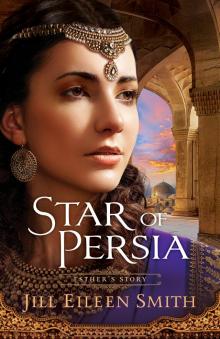 Star of Persia: Esther's Story
Star of Persia: Esther's Story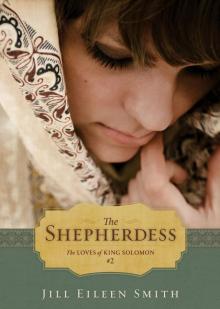 The Shepherdess
The Shepherdess Abigail (The Wives of King David Book #2): A Novel
Abigail (The Wives of King David Book #2): A Novel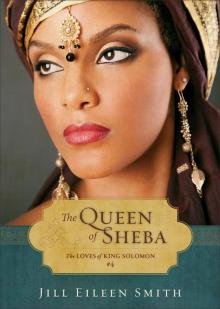 The Queen of Sheba
The Queen of Sheba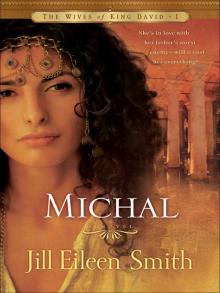 Michal
Michal Rebekah
Rebekah A Passionate Hope--Hannah's Story
A Passionate Hope--Hannah's Story Daughter of the Nile
Daughter of the Nile Rachel
Rachel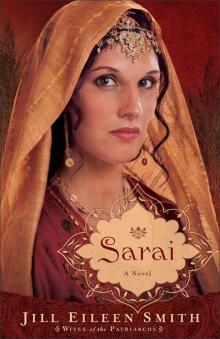 Sarai
Sarai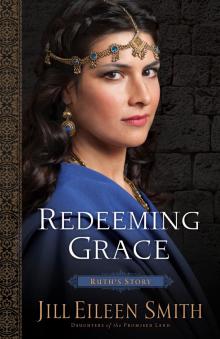 Redeeming Grace: Ruth's Story
Redeeming Grace: Ruth's Story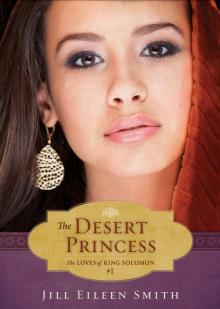 The Desert Princess
The Desert Princess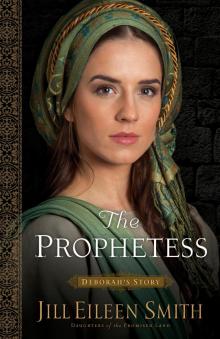 The Prophetess - Deborah's Story
The Prophetess - Deborah's Story